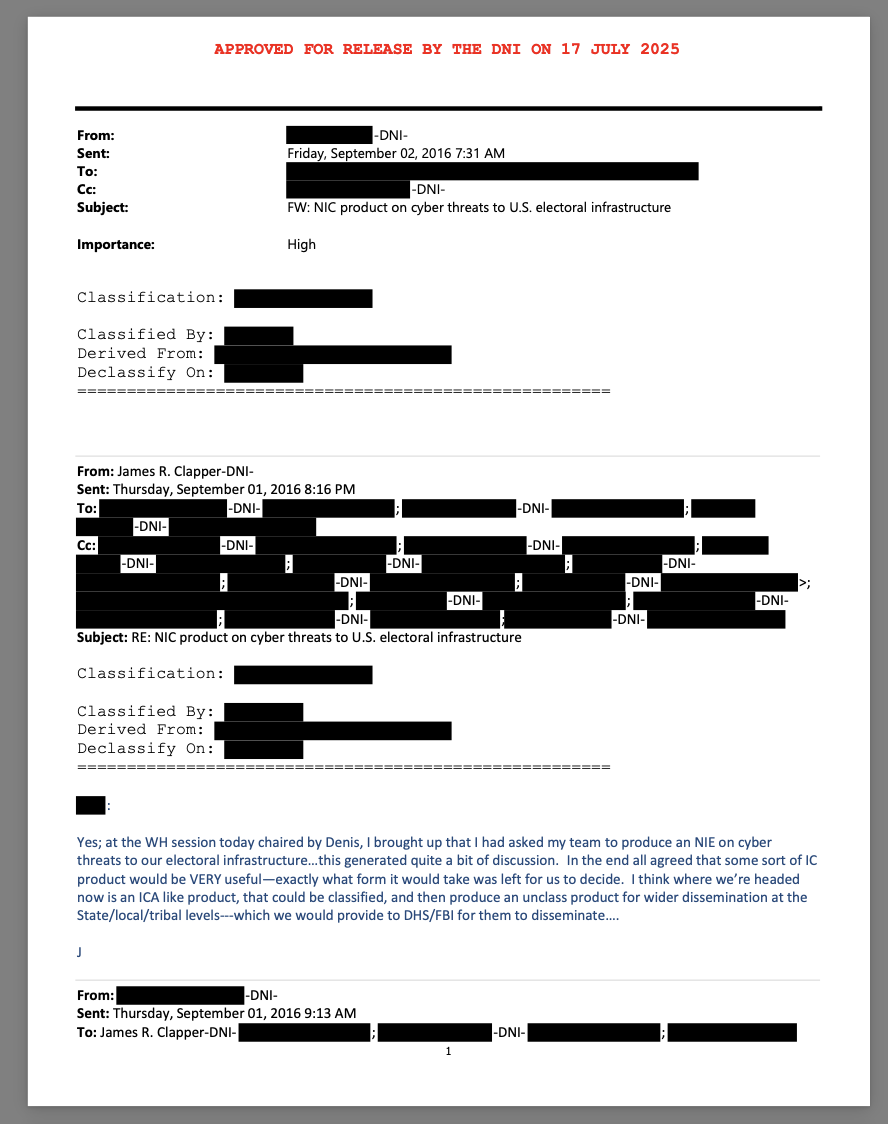Declassified Evidence Points to Obama-Era Efforts to Undermine Trump’s 2016 Victory, IC Documents Reveal
Executive Summary
Newly declassified documents from the Office of the Director of National Intelligence (ODNI) detail a coordinated effort by senior Obama administration officials to politicize intelligence, fueling the narrative that Russia decisively influenced the 2016 U.S. presidential election. The files reveal that prior to and immediately after the election, intelligence assessments found no evidence that foreign cyber operations altered the outcome, contradicting public claims and subsequent official reports. The newly released evidence, announced by DNI Tulsi Gabbard, calls into question the integrity of intelligence reporting during the transition period and highlights the vulnerability of U.S. democratic institutions to internal manipulation.
Analysis
On July 18, 2025, Director of National Intelligence Tulsi Gabbard released a cache of declassified records that document internal intelligence community (IC) debates, White House meetings, and IC assessments concerning alleged Russian interference in the 2016 U.S. election. The documents show that, as late as December 2016, the IC assessed that Russia was “probably not trying … to influence the election by using cyber means,” and that “foreign adversaries did not use cyberattacks on election infrastructure to alter the US Presidential election outcome.”
However, following a high-level White House meeting on December 9, 2016—including President Obama, DNI Clapper, CIA Director Brennan, and others—the IC was tasked with producing a new assessment detailing Russian election influence “per the President’s request.” This shift in direction was accompanied by the leaking of intelligence and talking points to media outlets, claiming Russian cyber operations had influenced the election outcome.
The declassified files demonstrate the original IC consensus: while Russia and other adversaries possessed the capability for cyber intrusions and influence operations, the decentralized nature of U.S. election infrastructure and multi-layered redundancies made covert manipulation of vote totals at scale improbable. Most reported intrusions focused on data theft and influence, not direct vote tampering, and the intelligence community judged the primary intent was to undermine public confidence, not to covertly alter outcomes.
These findings were reportedly disregarded in the January 2017 Intelligence Community Assessment (ICA), which—despite the objections and reservations of some IC professionals—asserted a high degree of Russian intent and success. Key sections of the declassified report show that both the FBI and NSA had “low confidence” in attributing certain leaks to Russia and expressed concerns over the politicization of intelligence. Further, evidence cited in the public narrative—such as the Steele Dossier—was known to be uncorroborated or fabricated by the time of the ICA’s release.
Director Gabbard’s statement frames these actions as an unprecedented abuse of executive power, describing them as a “treasonous conspiracy…to subvert the will of the American people and enact what was essentially a years-long coup.” The press release emphasizes the need for accountability to restore public trust and safeguard the integrity of future elections.
Forum and social media reactions, especially in radical online spaces, frame the revelations as confirmation of long-standing theories about “deep state” efforts to undermine the Trump presidency. While these perceptions should be viewed critically, they underscore the degree to which politicized intelligence assessments can erode faith in national institutions and stoke societal divisions.


